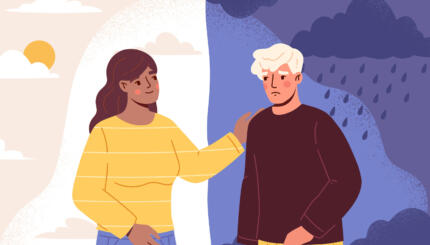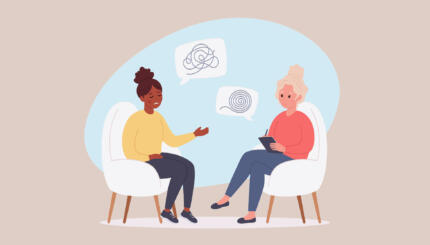Cortland Mathers-Suter was in seventh grade when he first experienced a bout of incredible, debilitating depression. He began acting out in fits of rage, and would spend hours in his room feeling sad for no reason. As his struggles continued into his high school years, he felt alone but feared saying anything at school in case one of his classmates would tease him.
Cortland was lucky to have parents who recognized the symptoms of depression and took him for counseling. They knew struggling emotionally wasn’t a weakness. But despite his parents’ support, he was teased for anxiety-related tics he developed with his illness. This led him to shy away from social situations, making an already tough situation even worse.
One in five teens experience some sort of mental health concern, according to Teen Mental Health, and the CDC finds suicide is the second highest cause of death for pre-teens, teens, and young adults. But the stigma—or sense of shame often linked with these diseases—can prevent teens from asking for help.
How Mental Illness Got a Bad Rap
If you had cancer, diabetes, or a brain tumor, you would seek treatment without a second thought. Being treated for a mental health issue is just as important, but in the past people didn’t see it as a legit problem and even blamed the person suffering for their predicament. Today, science shows that mental health conditions have biological and biochemical causes which are no one’s “fault,” and can be successfully treated just like physical illnesses such as diabetes. But because of its legacy, some people still snub, shun, or tease those struggling with a psychological disorder.
Slowly that’s changing, thanks in part to the rise of social media platforms that give teens a voice. “Because of social media, teens are more vocal than ever about what’s going on with them,” says Emily Grossman, MA, CPRP, NYCPS-P, an organizational development specialist at The Jewish Board’s Martha K. Selig Educational Institute. Today, numerous Facebook pages, online groups, and national campaigns focus on destigmatizing mental issues.
Shining an even brighter light on mental illness, many celebrities have come forward about their own mental health challenges, including Ryan Reynolds, who has dealt with anxiety; Lady Gaga, who has faced post traumatic stress disorder; Selena Gomez, who confronted depression and panic attacks; and Demi Lovato, who overcame an eating disorder. Sports heroes like Olympic swimmer Michael Phelps and New York Giants wide receiver Brandon Marshall have also shared their struggles with mental illness in an effort to bring awareness to these diseases.
Where to Find Support
Grossman, who was diagnosed with bipolar disorder in 1996, says she sees progress in the way teens and young adults think about mental illness. For instance, the topic wasn’t even covered in health class when she was in high school, and no celebrities were willing to come forward with their stories when she was a teenager. “Today’s teens have more exposure to the topic, and they are talking about it with their friends openly, too,” she says.
Beyond casual conversations, here are some ways you can help destigmatize mental health issues among your immediate circle of friends, and ways to find support if you feel embarrassed or unsure of your situation:
- Find communities. Whether online or in-person, support groups help you realize you’re not alone. “It would be so helpful if schools supported teens by hosting a ‘you’re not alone’ campaign or creating a group for those in need of support,” says Lisa Bahar, LMFT, LPCC, a family therapist in Dana Point, CA.
- Share your experience. “The more open you are about your situation, the more it inspires others to be open about theirs,” says Grossman. That’s why The Jewish Board created Here.Now., an online platform to find support, build connections, and reduce mental health stigma. Although being straight with friends might feel scary, “it brings people closer to you if they understand what’s really going on.” Not everyone will sympathize, but in the long-term you will feel freer telling the truth than covering it up. For example, after facing depression as a teenager, Cortland Mathers-Suter is now the director of AspenRidge Recovery, an addiction treatment center. He often shares his story about teenage depression in order to help others open up about their own struggles.
- Use tech to your advantage. Apps like the WRAP app let you put a plan in place for what to do if you have concerns about a mental illness or relapse. DBT therapy apps provide coping strategies. There are even medication management apps. “I think the more apps that help you manage your illness, the better,” Grossman says. A mental health expert can recommend ones that provide the highest quality of help.
How to Fight Back
If you’re delaying asking for help because you’re worried about being teased or losing friends, there’s no easy solution other than being brave. Don’t let mental illness define who you are. Understand that it’s not your fault, and there’s no guilt or shame in getting help any more than if you had a broken leg or the flu. “The people who care about you will be there no matter what you tell them,” says Grossman. By speaking up, you’ll open the door for others who may be going through the same thing as you. Stigma exists when people don’t have the full facts. You can play a role in spreading the word.
Special thanks to our experts:
Cortland M Mathers-Suter, MSSA, Managing Director, AspenRidge Recovery
Emily Grossman, MA, CPRP, NYCPS-P, Organizational Development Specialist Martha K. Selig Educational Institute, The Jewish Board
Lisa Bahar, MA, CCJP, LMFT, LPCC, Lisa Bahar Marriage and Family Therapy, Inc. in Dana Point, California






